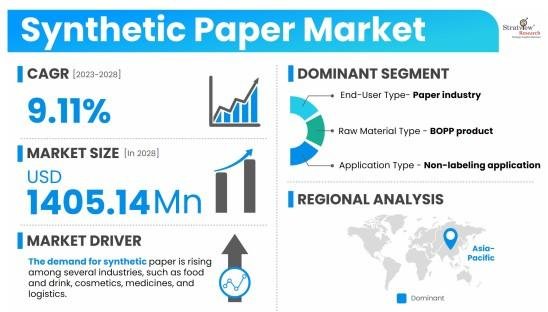Introduction
Synthetic paper is a form of paper-like material created from synthetic or non-fibrous materials. It has features and characteristics that are comparable to those of traditional paper. Due to its strength, resistance to tearing, water resistance, and other favorable qualities, it is used as a replacement for regular paper.
High-density polyethylene (HDPE) or polypropylene (PP) are two common polymer-based substrates found in synthetic paper. These substances have been selected for their dimensional stability, durability, and resistance to harmful environmental elements like moisture, chemicals, and UV rays.
"The synthetic paper market is estimated to grow from USD 827.2 million in 2022 to USD 1405.14 million by 2028 at a CAGR of 9.11% during the forecast period."
The Synthetic Paper Market is experiencing significant growth, driven by its increasing adoption in various industries that seek durable, versatile, and environmentally friendly alternatives to traditional paper. Synthetic paper, a material primarily made from polypropylene or other synthetic resins, combines the qualities of plastic with the appearance and functionality of paper. This blend of characteristics makes it suitable for applications where durability, water resistance, and tear resistance are crucial.
Market Dynamics and Growth Drivers
Several factors are contributing to the rising demand for synthetic paper. One primary driver is its eco-friendliness. As businesses and consumers become more environmentally conscious, the shift towards sustainable alternatives has accelerated. Synthetic paper, unlike traditional paper, does not require tree harvesting and is 100% recyclable, aligning with global sustainability goals and reducing the environmental impact associated with paper production.
Moreover, synthetic paper exhibits remarkable durability, outperforming conventional paper in terms of longevity and resilience. Industries such as packaging, labels, printing, and retail are increasingly adopting synthetic paper for these attributes. In packaging, for example, synthetic paper’s resistance to moisture and chemicals ensures that it retains quality and appearance, even in harsh environments. This makes it ideal for products that require prolonged shelf life or that are frequently handled, such as food packaging and pharmaceutical labels.
Key Applications and Industry Usage
The printing and labeling industries are among the largest consumers of synthetic paper. The high print quality and vibrant color reproduction of synthetic paper make it an excellent choice for branding and promotional materials. In the labeling sector, it is valued for its ability to endure rough handling, exposure to moisture, and temperature fluctuations, qualities that are essential for logistics and inventory management.
Additionally, synthetic paper is widely used in outdoor applications, such as maps, manuals, and signage, where traditional paper would deteriorate quickly due to environmental exposure. Its resistance to UV rays and ability to withstand extreme temperatures make it ideal for such purposes.
Regional Insights and Future Outlook
Geographically, the Asia-Pacific region holds a significant share of the synthetic paper market, driven by high demand from the packaging and labeling industries in countries like China, Japan, and India. North America and Europe are also prominent markets, where environmental regulations and sustainability initiatives fuel the adoption of synthetic paper.
In conclusion, the synthetic paper market is poised for continuous growth as industries increasingly prioritize durability and sustainability. With ongoing advancements in production technology and material innovation, synthetic paper is expected to expand its footprint across diverse sectors, paving the way for more eco-friendly and resilient solutions in the global market.
To get detailed information about the market dynamics, register here:https://www.stratviewresearch.com/Request-Sample/1483/synthetic-paper-market.html#form


